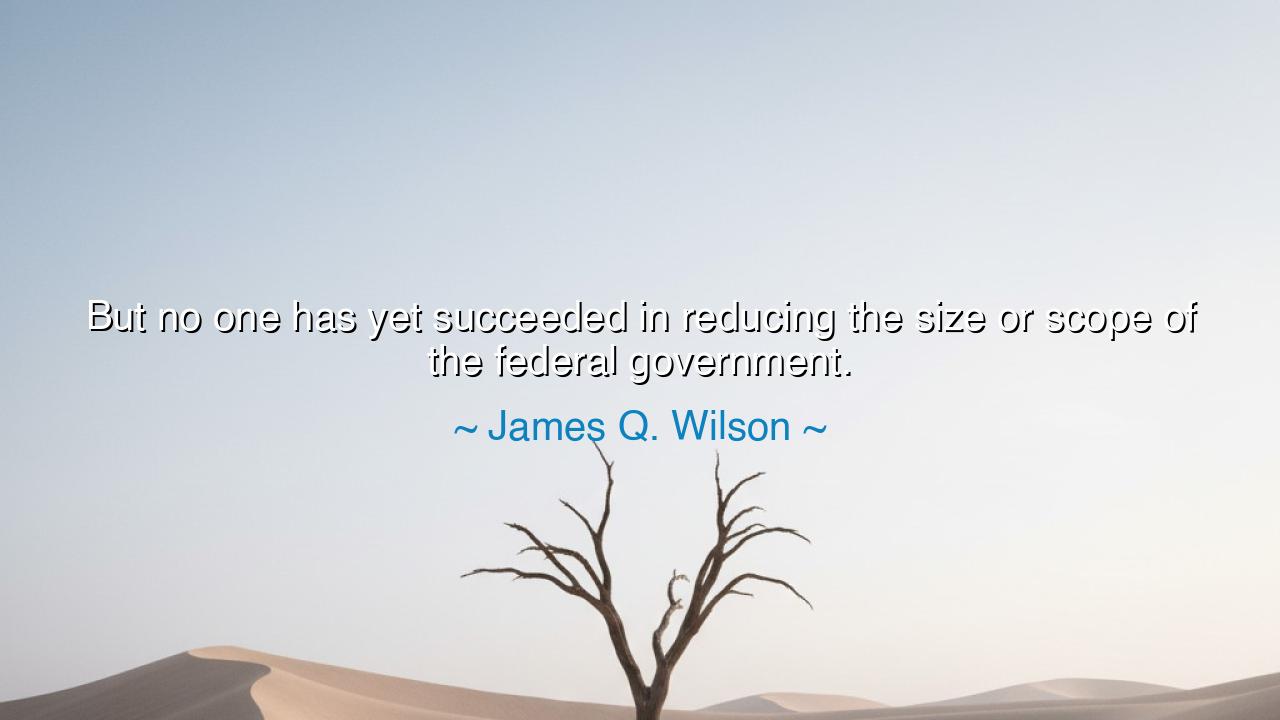
But no one has yet succeeded in reducing the size or scope of the






In the quiet and contemplative voice of the scholar, James Q. Wilson, a truth was spoken that rings through the chambers of governance like a solemn bell: “But no one has yet succeeded in reducing the size or scope of the federal government.” These words are neither boast nor complaint, but observation — a mirror held to the nature of power itself. They speak not only of America, but of all states and empires that have risen since the dawn of civilization. For in the long march of history, governments have ever grown like ancient vines — creeping, expanding, entangling, until even those who planted them can no longer see where the root ends and the shadow begins.
Wilson, a philosopher of public policy, knew well the heart of the matter. Governments are born in the fires of necessity — to defend the people, to build, to regulate, to serve. But as they grow, so too does their appetite. With every new law, every agency, every regulation meant to solve a problem, more threads are woven into the tapestry of bureaucracy. The result, as Wilson saw, is a living paradox: each generation seeks to limit the government, yet each crisis demands its expansion. No one has yet succeeded in reversing this tide, because the very nature of power is to preserve and extend itself.
In the days of ancient Rome, this truth was already known. The Republic, once lean and proud, governed by a handful of magistrates and guided by the Senate’s wisdom, became bloated by conquest and wealth. Armies needed pay, cities needed grain, citizens demanded spectacles and security. And so, offices multiplied, taxes spread like ivy across the empire, and the machinery of governance grew so vast that even emperors struggled to steer it. Rome’s fall did not come from weakness alone, but from the weight of its own system, a burden no reformer could lighten.
Wilson’s insight, then, is both historical and prophetic. He does not condemn government outright — for to live without governance is to descend into chaos — but he warns of its inertia, its tendency to resist contraction. Once a program is born, it rarely dies. Once a department is built, it rarely fades. Even when reformers cry for restraint, they find themselves bound by the very networks of dependence that power has spun. Like a great oak, the federal government stands rooted and immovable, fed by the soil of public demand and the rain of political ambition.
Consider the example of modern America: from the New Deal to the Great Society, from defense to welfare, from science to surveillance — every expansion begins in the name of necessity. Yet necessity never ceases. Crises multiply, and with them, the reach of government. Presidents and lawmakers have promised for decades to shrink its size, but instead, each era leaves behind a legacy of greater complexity. Even the voices of liberty, once fierce and free, often find themselves entrapped by the same system they sought to reform, for power, once granted, rarely returns to the people without struggle.
And yet, Wilson’s words are not without hope. For in understanding the nature of this growth, we may learn how to live wisely within it. The answer is not to abolish, but to awaken — to remember that government, however vast, is not an idol but a tool. It must serve, not rule. Its reach must be measured not by ambition, but by necessity. The ancients taught that the greatest ruler is the one who governs least because his people govern themselves. So too must we, as citizens, reclaim that self-rule — through knowledge, through vigilance, through courage.
Let this truth be passed down like sacred counsel: freedom shrinks when dependence grows. Every time we look to the state for what once we sought in ourselves, the scope of government widens, and the soul of self-reliance fades. The task, then, is not to rage against the structure, but to strengthen the spirit — to build communities that can stand without the constant hand of authority, to raise individuals who can act without decree. For only when the people become capable and virtuous can the state begin to recede.
So, my children of tomorrow, take Wilson’s words as both warning and guide. Do not curse the size of the government — understand why it grows. Do not wait for leaders to shrink it — become the kind of citizens who make its excess unnecessary. For the destiny of freedom is not written in laws or offices, but in the hearts of those who remember this truth: that power, like fire, must be watched constantly — for when it grows beyond its purpose, it consumes the very house it was meant to protect.






AAdministratorAdministrator
Welcome, honored guests. Please leave a comment, we will respond soon